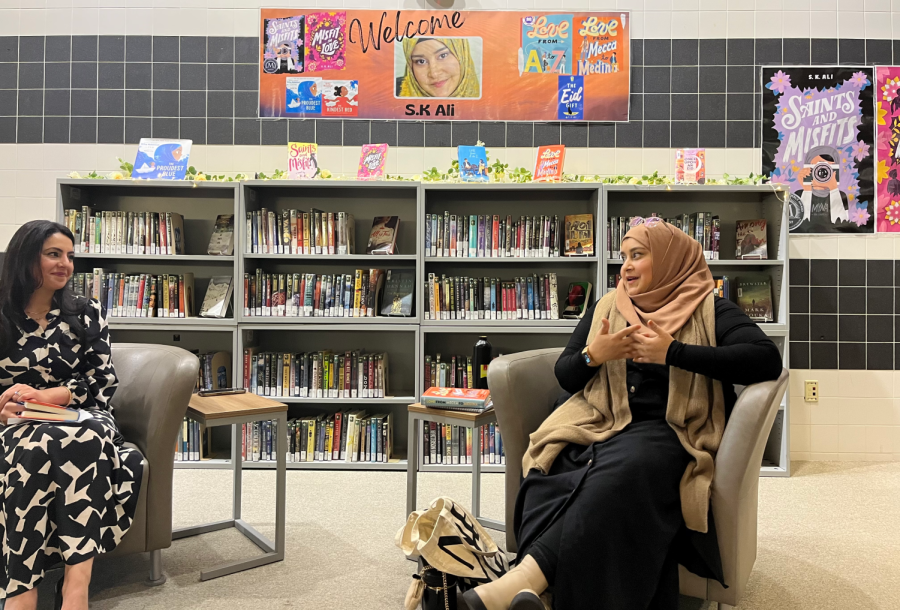Why Author S.K. Ali Brings Her “Muslim Self” Into Her Narratives
The “Love from A to Z” author discussed writing fiction from an unfiltered Muslim perspective.
October 24, 2022
For S.K. Ali, author of young adult novels “Love from A to Z” and “Saints and Misfits,” not concealing her Muslim self is an integral part of writing. Ali shared this on her visit to Amos Alonso Stagg High School on Oct. 22 to promote her new book, “Love from Mecca to Medina,” a sequel to “Love from A to Z.”
“Love from Mecca to Medina,” published Oct. 18, follows the story of Adam and Zayneb, a Muslim couple whose relationship is tested first by distance and then on their trip to Saudi Arabia to perform Umrah together, an Islamic pilgrimage.
Host and fellow author Nevien Shaabneh asked Ali how important it was for her to write a romantic comedy when, in Shaabneh’s words, we don’t normally equate Muslim with romance. Ali said that while romance is a theme that’s present in Muslim cultures, such as Arabic poetry and South Asian film, it doesn’t usually happen in a North American setting.
“I wasn’t seeing the kind of love stories that I’d had and my friends and family had had. I was seeing that Muslim love was presented only a certain way,” Ali said.
Ali mostly saw depictions of Muslim couples involved in forced marriages. While those are real stories, she said, she wanted to write from her own vantage point and incorporate romance in her books even though she doesn’t read much romance herself.
In “Love from A to Z,” Adam and Zayneb follow certain Islamic rules throughout the development of their relationship, including refraining from any physical touch before marriage.
“I was actually pleasantly shocked that it was familiar to so many global audiences,” Ali said.
She said it was a beautiful outcome that Muslims who are as far from her as Indonesia recognized the kind of love story she wrote and said it was how they saw love, too.
Massah Haj Ali is the president of the student equity committee at the high school and feels Ali’s work is groundbreaking when it comes to Muslim youth literature.
“When I was younger it was a given that any book I picked up wouldn’t have characters that looked like me or had friends that looked like mine,” she said.
Haj Ali believes the work of Muslim authors like Ali is invaluable.
“They aren’t just producing entertainment, but they’re spearheading a future where everybody can see themselves in the books that they read,” Haj Ali said.
The author said she grew up with what she described as heinous caricatures of what a Muslim is, and she involved herself deeply in the media committee at her mosque and writing letters to the editor in an effort to talk back to misrepresentation and stereotyping. However, Ali realized the books she loved were “just telling stories, not trying to set the record straight,” and she made the decision to allow her uncensored Muslim experience into her writing.
“It felt like a dam broke. All this creativity started to just flow out,” Ali said.
Audience member Samana Siddiqui shared that she, like Ali, grew up in Canada in the ‘80s and ‘90s. She said she loved to read but found that books with Muslim protagonists were usually preachy or defensive about Islam. She felt that for Ali’s characters, religion was naturally woven in. She asked Ali how she got to the point of writing that way.
Ali attributed much of it to the work of African American writers and intellectuals and specifically mentioned Toni Morrison. Ali started to read works by writers of color in university and learned from them how to not write for the external gaze or those who’ve classified you as an “other,” but rather to write from within oneself, for the audience one cares about.
Ali said that as an “other” growing up, there were very few places where she felt comfortable and at home.
“I firmly believe, it’s one of the reasons I write, that everyone should feel that sense of safety and community,” she said.
Ali hopes that some people, should they need it, can find that feeling in her books.
At the high school and on her previous book tour stops, Ali asked the audience a question about a detail in “Love from A to Z.” She awarded the first audience member to correctly answer her question a knit scarf resembling the one Zayneb wears around her neck on the cover of “Love from Mecca to Medina.”
“The scarf symbolizes the cozy warmth of a community that accepts and loves you,” Ali said.
Ali was also asked about being one of a small number of Muslim North American authors and whether that created added pressure from Muslim audiences to represent them a certain way. She shared there were people who, upon the release of the cover for “Love from Mecca to Medina,” felt Ali was disrespecting Islamic holy places by connecting them to romance. Ali decided to reach out to her author friends and send them the book to read before it was released, asking for feedback on the content and seeking Islamic scholarly opinion on the cover design.
Ali also made a request to the audience at the high school: “As readers and supporters, if you see something you don’t like in Muslim works and you want it to be better, call in.”
She said attacking authors publicly on social media can create a toxic pressure that stifles creativity and asked that readers instead share their concerns with authors directly. Ali shared the story of when she received an email from someone who didn’t approve of her decision to write about certain topics in her debut novel and how she appreciated the person’s effort to reach out.
In Ali’s debut novel, “Saints and Misfits,” the protagonist, Janna, deals with being sexually assaulted by a well-respected boy in her Muslim community.
“I realized I can engage with her,” Ali said about the sender of the email. “She realized I’m coming from a place of love; she’s coming from a place of love, and she’s one of my good friends now. I consult her with stuff now, and she consults me. She’s an author as well.”
Ali also shared advice she had for other writers of less-represented groups.
“One of the first things [publishers and editors] say is, we’re looking for confidence on the page.” To those writing stories that don’t fit into familiar stereotypes, she said, “Write from a place of strong confidence.”
Ali’s books deal with serious themes, but that isn’t all there is to them.
“I laugh out loud when I read your books,” Shaabneh said to Ali. Shaabneh asked Ali how she blends these themes with the funny and lighthearted tone of her books.
“I love reading light books,” Ali said. “I have always written with a light touch.”
Ali said she doesn’t like her stories to dwell on one thing for too long and tries to write them in a way that feels like they move quickly.
Ali has so far published books for children and young adults, but she revealed she is branching into writing for an older audience. Currently in the works is an adult romantic comedy she described as like cotton candy.
“I’m just writing the stories I wish I had,” Ali said.
“Love from Mecca to Medina” is available online and in bookstores now.


















